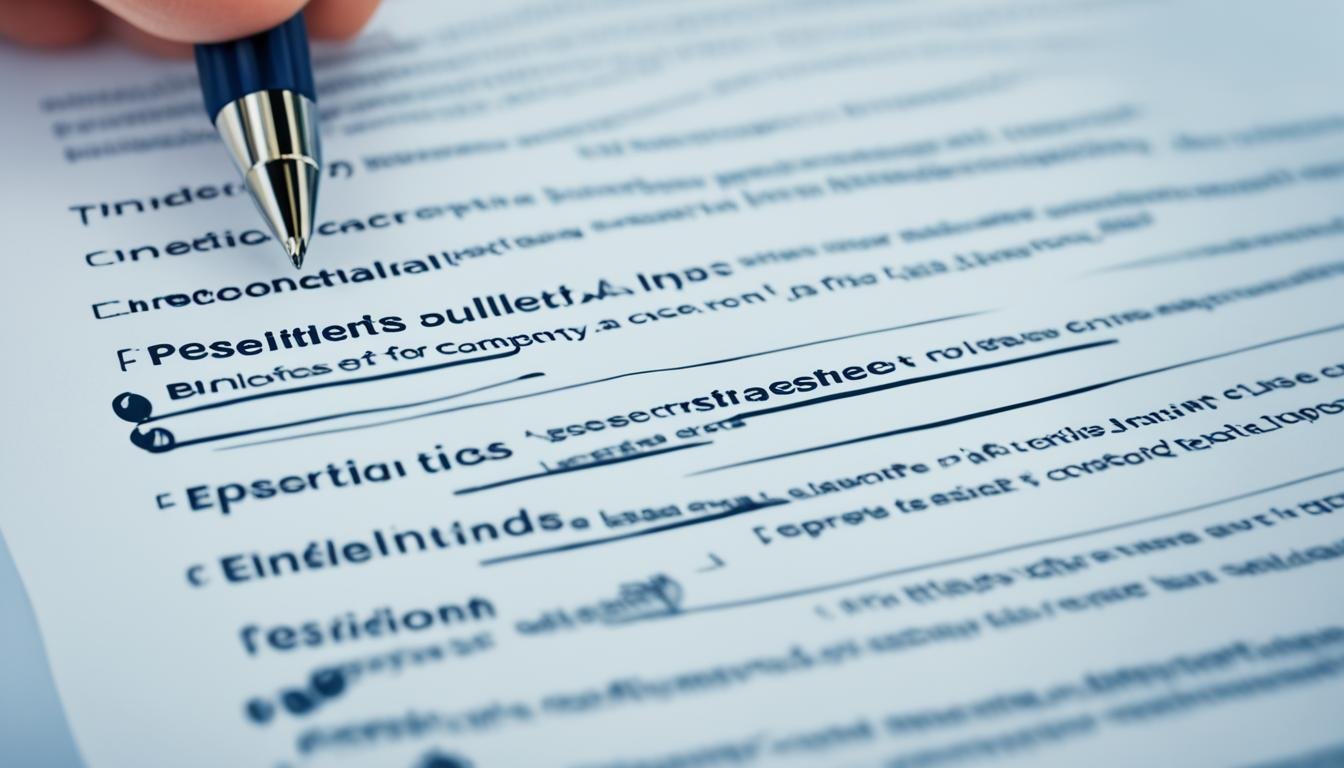Did you know a lot of legal battles in the U.S. involve personal injury cases? Actually, they account for almost half of all civil filings across the country.
Thinking about filing a personal injury case? Being prepared is key to succeeding. Here are 8 top tips to remember before you start:
Key Takeaways:
- Gather and preserve evidence to strengthen your case.
- Seek necessary medical treatment and document your injuries.
- Explore all types of damages and their potential value.
- Don’t settle for inadequate offers; negotiate for a fair settlement.
- Be cautious about what you post on social media during the case.
Maximize Your Potential Compensation
It’s vital to take steps before filing a personal injury case to maximize your compensation. Following key steps helps build a strong case. This puts pressure on the other party for a fair settlement.
Gather and Preserve Evidence
Begin by gathering and preserving evidence. Take photos of the accident scene and document your injuries. Also, collect any records or documents related to the incident. This evidence proves negligence and backs up your compensation claim.
Seek Necessary Medical Treatment
Getting medical treatment right away is crucial. It helps your health and your case. Document your injuries and follow medical advice closely. Keep detailed records of all your medical expenses.
Explore All Types of Damages
Understand the damages you might claim in a personal injury case. You can claim economic damages like medical bills, lost wages, and property damage. Non-economic damages, such as pain and suffering, are also important. An experienced attorney can help you claim all possible damages.
In a personal injury case, having a strong case is crucial. It pressures the responsible party into a fair settlement.
Reject Inadequate Settlement Offers
Insurance companies might offer you less than you deserve. Remember, you can say no to these offers. A personal injury attorney can help you evaluate offers. They can negotiate for the compensation you need.
Following these steps can help you get the most out of your personal injury claim. Make sure to consult with a skilled personal injury attorney. They can navigate the process and fight for your rights.
| Steps to Take Before Filing a Personal Injury Case | Understanding Personal Injury Laws | Important Considerations for Filing a Personal Injury Case |
|---|---|---|
| Gather and preserve evidence to prove negligence | Seek necessary medical treatment to document injuries | Explore all types of damages for compensation |
| Reject inadequate settlement offers |

The Role of Evidence and Witnesses
Gathering and saving evidence in a personal injury case is key. It helps prove the other party was careless. This evidence shows how badly you were hurt and its effect on your life.
Preserving Evidence in a Personal Injury Case
Start collecting evidence right after an accident. If you can, take pictures or videos of where it happened. Show anything dangerous or that helped cause the accident. This visual proof is very important later.
It’s also crucial to keep track of your injuries. Save all details about your medical care, like doctor visits and treatments. This shows how serious your injuries were and what treatment you needed.
Getting statements from witnesses is also very important. They can tell what really happened, supporting your claim. If anyone saw the accident, get their contact info. Ask if they’ll share what they saw.
The Importance of Witnesses in a Personal Injury Claim
Witnesses help support what you say happened. They can offer extra details that might be missed otherwise. Insurance companies and courts really listen to witnesses because they offer an outside view.
“Having witnesses who support your story is super valuable. They can dispute what the other side says. This shows their carelessness caused your injuries.” – Personal Injury Attorney, Laura Miller

Witnesses might have seen something that led to the accident. This could be a reckless driver or a broken product. Their stories help show the other party was at fault.
By saving evidence and getting witness statements, you make your personal injury claim stronger. This boosts your chance of getting a fair settlement. Witness stories are especially helpful in proving your case.
Dealing with Insurance Companies
Handling personal injury cases with insurance firms can be tough. You need to get how negotiations work and deal with adjusters. Plus, having a lawyer helps a lot with your case’s result.
Insurance companies often try to save money by offering low settlements. They might rush you to accept their first offer, which is usually too low. So, it’s key not to take less than you should.
When you talk to insurance adjusters, you need a plan and knowledge of injury laws. Be ready and know your claim’s value, including medical bills, lost income, and pain. Also, think about future losses.
Having a skilled lawyer helps a lot in negotiations. Lawyers know how to manage complex injury cases and look out for you. They’re good at dealing with insurance company tricks to get you a fair deal.
A lawyer collects evidence, checks how bad your injuries are, and builds a strong case. They negotiate for you, making things easier and letting you focus on getting better.
The Importance of Having an Attorney in a Personal Injury Case
It’s very important to have a lawyer for many reasons:
- A lawyer gets the tricky parts of injury laws and helps you with legal steps.
- They look into your case, get evidence, and make a strong case for you.
- Lawyers are good at dealing with insurance folks and know how to negotiate well to ensure you get what’s fair.
- If needed, they can stand up for you in court, fighting for your rights.
- With a lawyer, insurance companies take your claim more seriously.
In summary, a lawyer’s help is priceless in both negotiating and handling your injury case. They defend your interests, push for just compensation, and boost your chances of a good outcome. Don’t think twice about getting legal help to get the complete compensation you’re owed.
The Impact of Social Media
Social media plays a huge role in personal injury cases today. Many people use Facebook, Twitter, and Instagram to share experiences and make connections. But, posting on social media can greatly affect your case.
Insurance companies now use social media to watch claimants. They search for posts that contradict the injury or damages claimed. Even posts meant to be harmless can be twisted and used against you.
Insurance companies often monitor social media profiles to look for inconsistencies or evidence that contradicts your claim.
It’s important to be careful with what you post while dealing with a personal injury case. Here’s why you shouldn’t discuss your case or its details online:
- Evidence Contradiction: Posts or pictures can be misunderstood. Insurance companies might use them to question your claim.
- Privacy Concerns: Talking about your case on social media can expose private information to others.
- Legal Implications: Speaking about your case online might break legal rules or court orders. This could hurt your claim.
- Impact on Negotiations: Your social media can lead to lower settlement offers from insurance companies.
Insurance companies have teams dedicated to reducing their payout. To ensure a fair settlement, be very careful about your social media posts.
Think before you post. Reflect on how insurance companies might interpret your social media activity. Avoid talking about your case or posting things that could negatively impact you.
Instead, focus on recovery. Work with your attorney to collect evidence and let them handle the legal side. Not discussing your case on social media helps protect your rights and strengthen your position.
| Things to avoid on social media during a personal injury case |
|---|
| Discussing details of the accident |
| Posting pictures or videos that contradict your injury claims |
| Sharing updates about your case or legal proceedings |
| Engaging in conversations about your case with others |
| Complaining about insurance companies or the legal process |
Understanding the Personal Injury Claim Process in California
If you’re filing a personal injury claim, knowing your state’s laws is key. In California, it’s crucial to learn about the claim process. This knowledge helps you manage your case well.
In California, you have two years to file a claim after an injury. This rule is known as the statute of limitations. It’s vital to start your claim within this period.
Getting medical help right away is important for your health and your claim in California. Keeping records of your injuries and treatment proves the damage and who is at fault.
Key points to remember about personal injury claims in California:
- Understand the statute of limitations, which is two years from the date of the injury or discovery in California.
- Seek necessary medical treatment to document your injuries and establish their impact on your life.
- Accurate documentation, including medical records, police reports, and witness statements, can greatly support your claim.
- Consult with a personal injury attorney who specializes in California law to ensure your rights are protected.
Understanding California’s personal injury claim process helps you move forward confidently. Talking to a skilled attorney improves your chance of fair compensation.
We’ll conclude by summarizing the main points discussed. We’ll also offer final thoughts on filing a personal injury case.
Conclusion
Filing a personal injury case needs a lot of thought and prep. Following 8 key tips and getting help from a personal injury lawyer can boost your chances to win a fair settlement. You can get maximum compensation for your injuries this way.
Each case is different, so talking to a pro is crucial. They can guide you through your unique case details.

